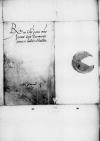Attulit nobis ⌊Mauricius⌋ telam mensatilem et reddidit ita, uti erat in ceratam cooperta et colligata. Georgio itaque ⌊Schewke⌋ pro eadem tela dono nobis data, Vestrae vero Paternitati pro illa ad nos transmissa agimus habemusque gratias. Et tela quidem ipsa eiusque artificium bene nobis placet, verum hoc in illa desiderabimus, quod careat nostris insigniis. Sed cum textores et artifices ob dispendium suum ea non intexuerint, boni aequi consulimus liberalitatemque ac studium gratificandi nobis ipsius ⌊Georgii Schewke⌋ gratum habemus.
Quod attinet preces Vestrae Paternitatis, ut ⌊ille⌋ burgrabiatum etiam in annum sequentem continuet ac gerat, danda est istic opera, ut ille inter hos, qui de more eligentur, etiam sit unus de numero electorum. Certo nobis persuademus, quod ⌊maiestas regia⌋ ⌊eum⌋ potius quam quemquam alium ad eum magistratum designabit et praeficiet paper damaged⌈[et]et paper damaged⌉, de quo est optime sua maiestas persuasa. Nos etiam ⌊ei⌋ non deer paper damaged⌈[r]r paper damaged⌉imus, modo ne ipse sibi desit, ut sit in numero elector paper damaged⌈[r]r paper damaged⌉um.
Bene et feliciter valeat Vestra Paternitas.


 BCz, 3465, p. 306
BCz, 3465, p. 306